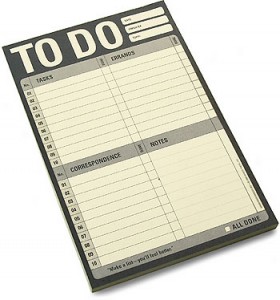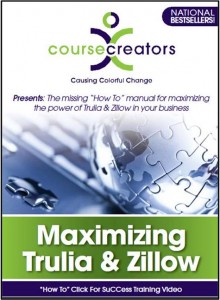The vast majority of consumers have no idea what a real estate agent does. We strongly recommend that in today’s market you need to have at your fingertips a list of “value added” services that you provide. The longer the better. Help counter the typical consumer statement that agents are overpaid which is based on a lack of understanding of what we do as professionals. Here is a partial list to get you started. Feel free to take our list, copy it, link to it, add to it and make it your own:
 101 THINGS THAT I DO FOR YOU THAT MOST PEOPLE DO NOT EVEN REALIZE!
101 THINGS THAT I DO FOR YOU THAT MOST PEOPLE DO NOT EVEN REALIZE!
1. Provide access to MLS listing database of homes for sale
2. Research all comparable sales in the neighborhood
3. Analyze market conditions and projections
4. Explain past market performance
5. Analyze all homes for sale in the neighborhood to assess your home’s marketing position
6. Counsel home sellers on the process of listing and selling their home
7. Familarize buyers with the neighborhood and market demographics for your home
8. Create, schedule and publish video tours
9. Discuss timing of the sale and the pricing of the home in order to meet your expectations
10. Schedule open houses to attract buyers
11. Prepare for open houses with announcements, postings and signage
12. Arrange for the placement of the For Sale Sign
13. Provide and create flyers for the sale of the home
14. Draft and create print advertisements of the home
15. Take safeguard precautions to minimize risks of loss and vandalism that occur during open houses
16. Receive and review offers from potential buyers
17. Review the buyer’s LSR and analyze the provisions of their loan to assure that they can get financing
18. Present and discuss all offers that are received
19. Check to make certain that all advertising is in compliance with the Code of Ethics and Fair Housing requirements
20. Outline the pros and cons of offers received from potential buyers
21. Thoroughly review the entire listing contract and all accompanying documentation regarding the signing of the listing agreement
22. Negotiate the offer with the buyer and/or their agent
23. Thoroughly review the offer and all it’s terms
24. Explain your legal obligations as a seller in the area of disclosure
25. Answer phone calls and inquiries regarding your property
26. Arrange and schedule showings of your properties at the request of buyers and/or their agents
27. Draft any necessary addendums and clauses that are necessary to the purchase contract
28. Help you review and fill out the mandatory Lead Based Paint Disclosure required from all sellers
29. Provide the appropriate SPDS form for the disclosure of all known conditions required of every seller
30. Guide you through and inform you of the status of the buyer’s loan with requests for periodic updates
31. Monitor and coordinate the escrow process and the handling of the earnest money deposit
32. Counsel you on the rules surrounding the handling of the earnest money deposit
33. Schedule and arrange the necessary inspections requested by the buyer
34. Schedule and arrange access to the home for the appraiser
35. Schedule and arrange the termite inspection and accomodate the buyer’s requests for information
36. Assist in making certain that the buyer gets the necessary HomeOwners Association information
37. Follow up with all prospective buyers who appear during open houses
38. Explain the nature of agency relationships and the way that agency relationships work in real estate transactions
39. Act in a manner that is in accordance with the Code of Ethics to fulfill all obligations to you as the seller
40. Field calls from all advertising and generate interest in the home through marketing efforts
41. Counsel you on periodic price changes that may be demanded due to changes in market conditions
42. Point out areas that are likely to be targetted by buyers on any requests for repairs
43. Provide counseling and guidance in regard to showing so that the home gets its best appearance
44. Locate and provide area and street maps to potential buyers
45. Review the BINSR request from the buyer and review with you the buyer’s requests for repairs
46. Be available on evenings and weekends when buyers are most likely to want to see your home
47. Counsel and guide you through your responses to the buyer’s requests for repairs
48. Provide professional references for any repairs that might decide to make in order to complete the sale
49. Review the preliminary title report received from the escrow company
50. Make certain that all requirements on the preliminary title report are being met and handled prior to closing
51. Check to make certain that the buyer has supplied title with necessary documentation and any power of attorney forms
52. Check the preliminary title report for the status of liens, encumbrances and taxes
53. Monitor the deadlines and timeframes that are contained in the purchase contract
54. Negotiate necessary changes in those timelines
55. Counsel you on the pros and cons of addendums regarding changes in the timelines
56. Advise you on the appraisal process and your role in the appraisal process as a seller
57. Keep the contract in check by issuing cure notices when necessary
58. Provide regular updates and status reports regarding the progress of the transaction
59. Assist you in relocation or buying another property
60. Co-ordinate multiple same day showings
61. Counsel and advise on the handling of multiple offers regarding the property
62. Handle negotiations of offers and counteroffers with buyers and their agents
63. Review completed disclosure forms to insure compliance with required disclosure obligations of all sellers
64. Answer and address questions posed by buyers regarding the property and its condition
65. Help you understand the process of the transaction
66. Perform a curb appeal assessment at the time of listing
67. Provide days on market analysis
68. Provide a full Comparative Market Analysis regarding your property
69. Counsel on the necessity and advantages of a home warranty program
70. Obtain plat map from the title company
71. Review title company charges and fess
72. Collect utility information and advise on the handling of utilities at the time of transfer
73. Discuss and advise on the exchange of occupancy
74. Update and monitor status of MLS listing to “Sale Pending”
75. Advise and monitor removal of loan contingency
76. Contact and discuss loan status with buyers loan representative
77. Confirm the processing of the buyers loan
78. Check on the status of delivery of buyers loan documents to the title company
79. Confirm the completion of all repairs
80. Coordinate the collection of the repair invoices and receipts
81. Deliver all receipts and invoices to the title company as required
82. Confirm the buyers acquisition of insurance on the home at the time of purchase
83. Review the HUD-1 Settlement statement and correct all inaccuracies
84. Make certain that all funds are being handled appropriately
85. Maintain the proper status of the For Sale sign, updating as sold and removing after transaction
86. Co-ordinate and schedule the closing of the transaction
87. Negotiate and arrange any final extensions of the closing date that may be necessary
88. Counsel and advise you on the closing process
89. Schedule all final walk through inspections that are demanded by the buyer
90. Attend and address issues raised in the final walk through inspections
91. Final check with the escrow officer to make certain that all required documentation is in place
92. Review the closing documents
93. Attend and accompany you to the closing to address any issues that you might have
94. Advise and counsel you on the final transfer of funds
95. Assist in the providing of wiring instructions on the day of closing to the title company
96. Assist in the transmission and delivery of any final documentation that may be required by title
97. Review and explain the role of title insurance in your transaction
98. Assist in the correction of any errors or mistakes in the final closing documents
99. Arrange for the exchange of keys and possession
100. Help counsel and advise you on the final handling of utilities
101. Thank you for your business and earn your trust for every real estate transaction you undertake
 The Art of Conversation is quite simple! It is a matter of creating something worth talking about!!
The Art of Conversation is quite simple! It is a matter of creating something worth talking about!!


 Just giving you a heads up!! You Tube Downloader has a new look!
Just giving you a heads up!! You Tube Downloader has a new look! In today’s high tech world of real estate agents should know that consumers are consistently using databases on the internet to find properties in places other than traditional MLS systems. Here are a few of the top sites being used by consumers, the link to them and a few facts you should know in regard to exploring these sites. They can be utilized by listing agents as a value added service and used by buyer representatives as an additional channels to find your buyers the home of their dreams. Just click on the name of the site to connect.
In today’s high tech world of real estate agents should know that consumers are consistently using databases on the internet to find properties in places other than traditional MLS systems. Here are a few of the top sites being used by consumers, the link to them and a few facts you should know in regard to exploring these sites. They can be utilized by listing agents as a value added service and used by buyer representatives as an additional channels to find your buyers the home of their dreams. Just click on the name of the site to connect. ZILLOW
ZILLOW 101 THINGS THAT I DO FOR YOU THAT MOST PEOPLE DO NOT EVEN REALIZE!
101 THINGS THAT I DO FOR YOU THAT MOST PEOPLE DO NOT EVEN REALIZE! Creating a relationship and trying to uncover the true motives, fears and goals of our clients depends on how good we are at digging deep. The less we talk and the more we listen the more we will learn about how to really serve their needs and exceed their expectations. From our experience and the input of dozens of agents these are all questions that will help you dig deep with your seller. Consider using some of these questions in your next listing presentation.
Creating a relationship and trying to uncover the true motives, fears and goals of our clients depends on how good we are at digging deep. The less we talk and the more we listen the more we will learn about how to really serve their needs and exceed their expectations. From our experience and the input of dozens of agents these are all questions that will help you dig deep with your seller. Consider using some of these questions in your next listing presentation.
 As a buyer in Arizona you are free to choose any lender with whom you would like to work. You can choose a local company, a national bank or an internet lender. The choice of your financing entity is entirely up to you. However, it is not a choice you should make lightly. Any lender you choose to work with must work in conjunction with you, your real estate agent and your escrow/title company.
As a buyer in Arizona you are free to choose any lender with whom you would like to work. You can choose a local company, a national bank or an internet lender. The choice of your financing entity is entirely up to you. However, it is not a choice you should make lightly. Any lender you choose to work with must work in conjunction with you, your real estate agent and your escrow/title company. The process of choosing a lender is an important step in buying your home. Buying a home is the single biggest investment you are ever likely to make and your choice of professionals to assist you in that process requires some effort on your part. Not just choosing the lender who offers you the best interest rate over the phone. Here are some fundamental questions you may want to ask of any lender before you ask them to help you with the purchase of your home.
The process of choosing a lender is an important step in buying your home. Buying a home is the single biggest investment you are ever likely to make and your choice of professionals to assist you in that process requires some effort on your part. Not just choosing the lender who offers you the best interest rate over the phone. Here are some fundamental questions you may want to ask of any lender before you ask them to help you with the purchase of your home. Do you ever wonder why your buyer client’s think they are going to get the keys at closing? Do client’s sometimes seem surprised that you are writing the contract rather than a lawyer? Is your seller upset because they will not be able to close using a power of attorney that they have used in many other situations?
Do you ever wonder why your buyer client’s think they are going to get the keys at closing? Do client’s sometimes seem surprised that you are writing the contract rather than a lawyer? Is your seller upset because they will not be able to close using a power of attorney that they have used in many other situations?
 Subdivision law can be complex and in Arizona failure to comply with it poses significant legal risks to the people involved in a real estate transaction. Contrary to popular opinion you don’t have to be a developer, a contractor or even create a lot line to get labeled a subdivider:
Subdivision law can be complex and in Arizona failure to comply with it poses significant legal risks to the people involved in a real estate transaction. Contrary to popular opinion you don’t have to be a developer, a contractor or even create a lot line to get labeled a subdivider: RSS Feed - Blog
RSS Feed - Blog YouTube Channel
YouTube Channel
 Theresa @ LinkedIn
Theresa @ LinkedIn